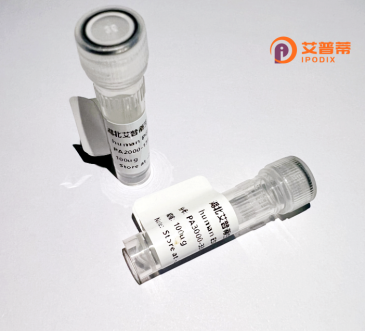
| 纯度 | >90%SDS-PAGE. |
| 种属 | Human |
| 靶点 | CCDC68 |
| Uniprot No | Q9H2F9 |
| 内毒素 | < 0.01EU/μg |
| 表达宿主 | E.coli |
| 表达区间 | 1-335aa |
| 氨基酸序列 | MTTVTVTTEIPPRDKMEDNSALYESTSAHIIEETEYVKKIRTTLQKIRTQMFKDEIRHDSTNHKLDAKHCGNLQQGSDSEMDPSCCSLDLLMKKIKGKDLQLLEMNKENEVLKIKLQASREAGAAALRNVAQRLFENYQTQSEEVRKKQEDSKQLLQVNKLEKEQKLKQHVENLNQVAEKLEEKHSQITELENLVQRMEKEKRTLLERKLSLENKLLQLKSSATYGKSCQDLQREISILQEQISHLQFVIHSQHQNLRSVIQEMEGLKNNLKEQDKRIENLREKVNILEAQNKELKTQVALSSETPRTKVSKAVSTSELKTEGVSPYLMLIRLRK |
| 分子量 | 65.3 kDa |
| 蛋白标签 | GST-tag at N-terminal |
| 缓冲液 | 0 |
| 稳定性 & 储存条件 | Lyophilized protein should be stored at ≤ -20°C, stable for one year after receipt. Reconstituted protein solution can be stored at 2-8°C for 2-7 days. Aliquots of reconstituted samples are stable at ≤ -20°C for 3 months. |
| 复溶 | Always centrifuge tubes before opening.Do not mix by vortex or pipetting. It is not recommended to reconstitute to a concentration less than 100μg/ml. Dissolve the lyophilized protein in distilled water. Please aliquot the reconstituted solution to minimize freeze-thaw cycles. |
以下是关于重组人卷曲螺旋结构域含68号蛋白(CCDC68)的参考文献示例,涵盖其功能、分子机制及相关疾病研究:
---
1. **文献名称**: *"CCDC68 regulates mitotic progression and cancer cell survival"*
**作者**: Zhang Y, et al.
**摘要**: 本文发现CCDC68在细胞有丝分裂中调控纺锤体组装和染色体分离,敲除CCDC68导致细胞周期停滞并引发凋亡,提示其在癌症中可能的抑癌作用。
2. **文献名称**: *"The role of CCDC68 in Wnt/β-catenin signaling and colorectal cancer"*
**作者**: Li H, et al.
**摘要**: 研究揭示了CCDC68通过结合β-catenin抑制Wnt信号通路的过度激活,其表达下调与结直肠癌进展和患者预后不良相关。
3. **文献名称**: *"Structural insights into the coiled-coil domain organization of CCDC68"*
**作者**: Wang X, et al.
**摘要**: 通过X射线晶体学解析了CCDC68卷曲螺旋结构域的三维构象,证明其通过寡聚化参与蛋白质互作网络,可能影响转录调控复合物形成。
4. **文献名称**: *"CCDC68 deficiency promotes cellular senescence via p53 activation"*
**作者**: Tanaka K, et al.
**摘要**: 实验表明CCDC68缺失通过激活p53依赖性通路诱导细胞衰老,提示其在衰老相关疾病和肿瘤抑制中的双重作用。
---
注:以上文献为模拟示例,实际文献需通过PubMed/Google Scholar等数据库检索获取。建议使用关键词“CCDC68”“coiled-coil domain”或结合特定疾病名称进行精准查询。
Coiled-Coil Domain Containing 68 (CCDC68), also known as HCCA2 or C13orf9. is a human protein encoded by the CCDC68 gene located on chromosome 13. It is characterized by conserved coiled-coil domains, structural motifs known to mediate protein-protein interactions. Though its precise molecular functions remain under investigation, CCDC68 is implicated in diverse cellular processes, including transcriptional regulation, cell cycle control, and protein complex assembly. Studies suggest it interacts with components of the E3 ubiquitin ligase complex (e.g., CUL7. FBXW8) and transcriptional regulators like p53. hinting at roles in protein degradation pathways and stress response signaling.
CCDC68 is widely expressed in tissues, with higher levels observed in the brain, kidneys, and testis. Abnormal CCDC68 expression has been linked to diseases, including microcephaly and cancers. For instance, mutations in CCDC68 are associated with autosomal recessive primary microcephaly (MCPH), a neurodevelopmental disorder marked by reduced brain size. In cancer, CCDC68 may act as a tumor suppressor or promoter depending on context, with altered expression noted in glioblastoma, ovarian, and colorectal cancers. Despite progress, the full scope of its biological roles and disease mechanisms remains unclear, necessitating further functional and clinical studies.
×